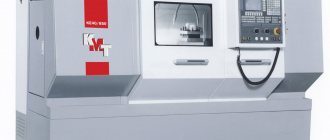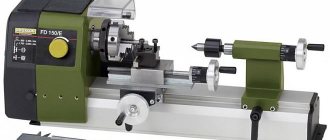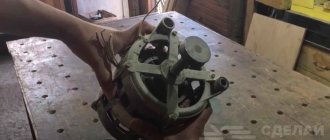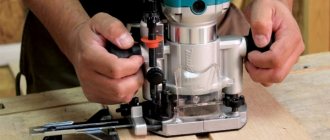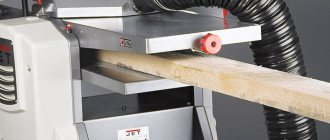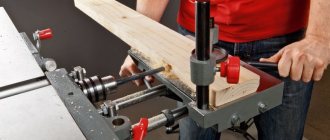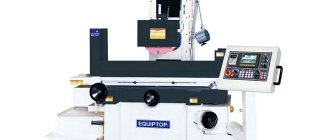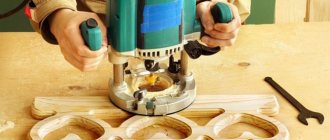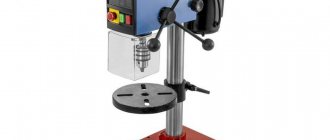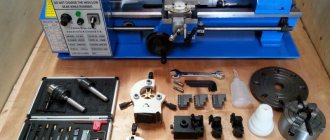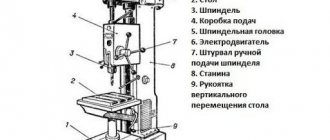Classification of drilling machines
Drilling equipment is divided into:
- Vertical drilling – great for use in a small workshop or garage;
- Single-spindle semi-automatic machines - drilling is done automatically, everything else is done by the operator;
- Multi-spindle semi-automatic machines - it is possible to process several holes due to the presence of several spindles;
- Jig boring – necessary for creating holes with strict adherence to the required parameters;
- Radial drilling - holes can be processed anywhere in the part due to the ability to move the spindle relative to the workpiece;
- Boring – machining of holes can occur without additional equipment and markings
- Diamond boring machines – designed for fine boring of holes with a minimum tolerance for cylindricity (3-5 microns);
- Horizontal drilling and center - used to create deep holes;
- Various drilling machines are special-purpose machines for specific purposes.
Types of metal-cutting equipment
Depending on their purpose, metal-cutting machines are divided into nine main groups. These include the following devices:
- lathes - all types of lathe machines (in the marking they are indicated by the number “1”);
- drilling and boring - machines for performing drilling operations and boring (group “2”);
- grinding, polishing, finishing - metal-cutting machines for performing finishing, grinding, sharpening and polishing technological operations (group “3”);
- combined - metal-cutting devices for special purposes (group “4”);
- thread and gear processing - machines for processing elements of threaded and gear connections (group “5”);
- milling - machines for performing milling work (group “6”);
- slotting, planing and broaching - metal-cutting machines of various modifications, respectively, for planing, slotting and broaching (group “7”);
- cutting - equipment for performing cutting work, including saws (group “8”);
- different - examples of such metal-cutting units are centerless-grinding, saw-cutting and others (group “9”).
Groups and types of metal-cutting machines (click to enlarge)
In addition, metal cutting machines can be one of the following types:
- multi- and single-spindle, specialized (semi-automatic and automatic), multi-cutting copying, turret, drilling and cutting, rotary, frontal and special types of lathes;
- equipment for performing technological operations of boring and drilling: multi- and single-spindle, semi-automatic, drilling machines of vertical, horizontal and radial type, boring devices of coordinate, diamond and horizontal type, various drilling models;
- various types of grinding machines (flat, internal and cylindrical grinding), roughing and polishing equipment, sharpening and specialized units;
- types of metalworking machines designed for processing elements of gear and threaded connections: gear cutting machines (including those intended for processing conical wheels), gear cutting machines - for cylindrical gears, gear milling, thread cutting, thread and gear grinding, gear finishing, checking, thread milling, devices for processing the ends of teeth and elements of worm pairs;
- metal-cutting machines belonging to the milling group: cantilever (vertical, horizontal and universal models) and non-cantilever (vertical devices, longitudinal, copying and engraving models);
- planing equipment and models for similar purposes: longitudinal machines on which one or two stands are installed; horizontal and vertical broaching devices;
- cutting equipment: equipped with an abrasive wheel or a smooth metal disk, cutter or saws of various designs (band, disk, hacksaw); straightening-cutting types of metalworking machines;
- other types of machines for processing metal workpieces: dividing machines, used for monitoring drills and grinding wheels, filing, balancing, leveling and centerless roughing, sawing.
Vertical milling machine is one of the representatives of an extensive milling group
Classification of metal-cutting machines is also carried out according to the following parameters:
- by weight and overall dimensions of the equipment: large, heavy and unique;
- by level of specialization: machines designed for processing workpieces of the same size - special; for parts with different but similar sizes - specialized ones; universal devices that can be used to process parts of any size and shape;
- according to the degree of processing accuracy: increased - P, normal - N, high - B, especially high accuracy - A; There are also machines that can perform particularly precise processing - C, they are also called precision.
Designation
Drilling equipment is divided into models according to the table of metal-cutting machines. Each model is unique and has a corresponding name, consisting of a set of numbers and letters.
The first number indicates belonging to a specific group of machines, 2 – drilling group. The second number indicates the type of machine. The third and fourth digits indicate an important parameter for the machine, that is, the maximum diameter of the hole being machined.
If there is a letter between the first and second numbers, then it indicates the modernization of the original machine. The letter at the end speaks of the creation of a machine different from the original based on the main model.
Let's look at a few examples:
- 2118 – vertical drilling machine, achievable hole diameter – 18 mm.
- 2N118 – vertical drilling machine, achievable hole diameter – 18 mm, modernized;
- 2N118A - vertical drilling machine, achievable hole diameter is 18 mm, the letter A indicates the automation of the machine.
Cost and main manufacturers
Horizontal drilling machines are quite expensive devices. Even for old Soviet models of these devices you will have to pay a tidy sum, but a modern machine with numerical software will cost a fortune. Of course, on the market for used devices you can find high-quality goods at a relatively reasonable price, but purchasing them is quite a risky business.
If we talk about Soviet drilling machines of this type, it is worth noting that although they were produced several decades ago, they still have good production characteristics and a relatively low cost. You can buy such a device for 1-1.5 thousand dollars. Machines in good condition and with a wider range of applications will cost from 2 to 5 thousand dollars.
Drilling machine design
Drilling machines are used for both industrial and domestic purposes. However, the differences between them are not significant. Therefore, it is more advisable to consider what a household drilling machine consists of, since it has smaller dimensions compared to its industrial relative.
The following mandatory components can be distinguished:
- A massive base on which a vertical stand is attached;
- Vertical stand with drill head
- Drilling head, consisting of a spindle assembly and an electric motor with a belt drive;
- The spindle head on which the chuck is located
Modern machining centers
CNC drilling centers have a PU milling unit base. An isolated working area with a unit for changing high-speed tools and an automatic chip removal function with a liquid supply with a cooling mode through the spindle are the main differences of this device. Machining centers are designed for fast processing of high quality, thanks to a variety of tools, different operations and are:
- horizontal;
- vertical.
These machines are capable of operating both automatically and semi-automatically and follow the same operations as drilling and milling machines.
Therefore they boldly:
- drill out;
- countersink;
- milled;
- drill holes;
- cut external threads;
- cut the internal thread.
If the master wishes, these centers can perform the grinding process. The main components of the center are considered to be a multi-position tool changer, which is capable of being controlled by a new generation control unit. The positioned tool system allows for high-precision processing and reduces operation time.
Operations performed
Using drilling equipment you can do everything related to making a hole:
- Drilling is the rough creation of a hole in solid material.
- Reaming is an increase in the diameter of a previously created hole.
- Countersinking is a semi-finish processing of a hole in order to increase its accuracy.
- Reaming is the finishing of a hole that comes after countersinking.
- Countersinking is the creation of recesses for the heads of bolts, screws and rivets.
- Countering is the finishing treatment of the flat bottom of the recess, comes after countersinking.
- Threading – creating a threaded surface.
Vertical drilling machine JET JDP-20FT 10000460T
The product is equipped with a belt drive running from the electric motor to the spindle. Thanks to this equipment, it is possible to process large-sized workpieces and parts due to the presence of clamping grooves in the base.
The maximum diameter of the hole that can be drilled into workpieces using such a machine is 32 mm. In this case, the torque of the electric motor is transmitted through pulleys and a belt. The machine has 12 speeds from 70 to 1600 rpm.
Materials
The main elements of the JET JDP-20FT 10000460T of this rating are made of gray cast iron, characterized by excellent performance, durability and reliability. The machine column is made of steel pipe of sufficient thickness.
Note! The unit in question does not need to be assembled yourself after purchase. This drilling machine can be used for its intended purpose right out of the box without any additional manipulations.
Specifications
JET JDP-20FT 10000460T rating has the following characteristics that affect the quality of its work:
- Electric motor power 0.85 kW
- The maximum drilling diameter for steel and cast iron is 32 and 35 mm, respectively
- Table dimensions 425 by 475 mm
- Belt drive
- Total weight without box 122 kg
- Spindle overhang is 120 mm
- Stand diameter 92 mm
- The drilling machine is connected to a 380-volt power supply.
JET JDP-20FT 10000460T in the rating is the most powerful and productive unit among belt-driven machines. It can be used for both amateur and professional purposes. Using this equipment, you can complete the task of drilling and processing holes in the shortest possible time.
Tool
A significant number of different tools are offered for a drilling machine.
Drill. Depending on the shape of the hole being made, metal drills are divided into:
- Spiral;
- Conical;
- Crowned
- Stepped
The twist version looks like a classic drill needed to make a cylindrical hole. The cutting part of the tool cuts into the metal, drilling a hole. The working surface has a spiral design designed to remove chips from the hole being created. The shank is used to secure the part in the machine chuck.
Conical drills are very convenient for drilling in one pass; there is no need to create a hole of a smaller diameter for future drilling. However, the use of such a tool requires high machine power.
Core drills are an empty cylinder with serrations along the entire end, forming a “crown”. They are required to create large diameter holes.
Step drills are a great discovery in the world of drilling tools. Its versatility allows you to create holes of different diameters without using other tools.
Countersinks. The principle of operation is similar to that of a drill. The first group serves for intermediate processing, leaving allowance for reaming, while the second group processes the hole completely without the need for subsequent processing.
Sweeps. This tool is classified according to many criteria, but we will only talk about the main types of sweeps.
Cylindrical reamers. Necessary for finishing cylindrical holes.
- Conical reamers. After using such a tool, the hole takes a conical shape.
- Step sweeps. The principle of operation is the same as that of step drills.
- Countersinks. They are divided into cylindrical, conical and end.
- Cylindrical ones form a recess for hardware with an internal hexagonal hole.
- Conical ones create a recess for hardware with countersunk heads
- Face (forging) are necessary for processing the bottom of the recess in order to increase the perpendicularity between the supporting plane and the axis of the hole.
Taps. They consist of a shank and a working part, consisting of a cutting and calibrating fragment. There are grooves for removing chips. When cutting threads, two taps are used, one for rough cutting of threads, the second for finishing.
Jig boring machines
Jig boring machines can produce a wide variety of machining of cylindrical and conical holes. The orientation of the part can change in any plane. You can not only drill, but also bore the surface with cutters, cut not only cylindrical, but also conical threads inside the workpiece space.
At some enterprises, to make holes with high precision, machines are installed in isolated rooms. They constantly maintain a fixed temperature and humidity.
Most often, such requirements are imposed on equipment used in space production. Some chemical industries require increased precision in the execution of work.
Safety precautions
PROHIBITED:
- Start work without checking for serviceability and grounding;
- Start work activities without special clothing;
- Work without safety glasses or headgear.
To avoid injury, follow these guidelines:
- Overalls should fit snugly to the body;
- Do not clutter the machine with unnecessary items;
- Do not use a broken tool;
- Do not try to stop the chuck during the cutting process;
- Check the fastening of the drill in the chuck;
- Wait until the machine stops, after which you can leave the workplace;
- Under no circumstances should you adjust the part while the machine is running.
Exploitation
To safely operate a metal-cutting machine, you need to follow safety rules and take into account some features:
- Work using protective equipment, glasses, headphones, gloves.
- Check the integrity of the equipment (drills, cutters, cutters, abrasives) before starting the installation.
- Cool the work area. Water or oil can be used for this.
- Clean the structure from metal shavings after work.
- Lubricate moving parts at least 2 times a month.
You cannot work on machines that make extraneous noise, with missing fasteners, or exposed wires.
Metal-cutting machines combine various installations that are used for metal processing. They are divided according to different factors and have certain markings. By learning to read the numbers and letters indicated on the equipment body, you can learn a lot of information without reading the description or technical data sheet.
Tips for choosing
Please note the following points:
- Processed material. There is no need to buy equipment with huge capacities for drilling wood or plastics.
- Machine type. Select the machine according to the processing you need. Why do you need an expensive multi-spindle machine if you need to drill identical small holes?
Drilling machines for industrial use
It is enough to look at the drawings or photos of industrial drilling machines to understand that they are much more complex devices than household models. Most of the models of such machines are universal equipment that allows you to perform not only drilling in metal and other materials, but also a number of other technological operations.
Multi-spindle drilling machine GILLARDON RF 25
Production drilling machines include devices of the following categories.
Tabletop machines
Such machines are small in size and light in weight. They are used for drilling holes with a small diameter.
Vertical drilling (column) machines
These machines are used to equip small-scale and individual production. With their help, you can make holes in metal workpieces with a diameter in the range of 18–75 mm.
Radial drilling machines
This equipment is used for processing massive metal parts or workpieces in which it is necessary to form holes with centers located along a circular arc. The design of a drilling machine in this category is characterized by a fairly large overhang of the spindle unit, the value of which can reach 1300–2000 mm.
Coordinate drilling devices
The use of such machines is relevant in cases where high demands are placed on the accuracy of the location of several holes in a part.
Horizontal drilling machines
These devices process holes of significant depth (shafts, axles, rods, etc.).
Centering machines
Such equipment is used to form center holes located at the ends of the workpieces.
Multi-spindle machines
On units equipped with several spindle heads, multiple holes located in vertical, horizontal and inclined planes can be processed simultaneously.
Combined machines
On devices of drilling-milling, drilling-turning, drilling-slotting and a number of other categories, various technological operations can be simultaneously performed.
Universal drilling and milling machine Stalex-LM1450-2
The most common are vertical and horizontal drilling machines. Many modern models of drilling machines are equipped with numerical control systems, which can significantly increase the productivity of such equipment and ensure high processing accuracy. Machines with such a control system are used primarily to equip serial and large-scale production enterprises.
Among the special drilling equipment, mention should be made of magnetic machines, which are used to make holes in large parts. Such devices, equipped with a special magnetic base, are placed directly on the surface of the workpiece and are securely held on it due to a powerful magnetic field. The big advantage of machines in this category is that they can be located in any spatial position.
The unique design of magnetic machines makes it possible to process metal where it is impossible to do with conventional equipment
Despite the fact that any drilling machine can be used to make holes in workpieces made of various materials, special models are created for woodworking and furniture factories that can be equipped with one or more spindles, including rotary-type working heads. Using such equipment, you can not only make holes in wood parts, but also create nests, grooves, and remove knots.
The use of modern drilling and filler equipment in furniture factories, which has great versatility and functionality, allows it to quickly produce furniture structures even according to the most complex drawings.
Rating of the best drilling machines
For 2022, the ranking of the best machines includes the following models:
| Place | Model | Peculiarity |
| 1 | RedVerg RD-4113 | Good value for money |
| 2 | Caliber SS-13/400A | Accuracy of work |
| 3 | Jet JDP-8L | Durability and high build quality |
| 4 | Ryobi RDP102L | Design reliability |
| 5 | Einhell BT-BD 701 | High quality construction, basic instructions for use |
| 6 | PROMA BY-3216PC/400 | Wear-resistant, durable, overheat protection |
| 7 | Euroboor ECO 100/4 D | The best machine for working with large diameter holes |
About the advantages and disadvantages
For high protection against various damages and breakdowns, the manufacturer has assembled all the important components and mechanisms into a solid cast-iron body. For additional convenience, the unit has a built-in lighting function for the work table and processing area.
The production of the product began in the early eighties. Although more than a decade has passed since then, the popularity of the unit has not diminished. To this day it is in great demand at large enterprises and small private workshops. The 2m112 model is highly valued by specialists of this profile for its reliability, ease of operation and good characteristics.
Even if the 2m112 machine has completely malfunctioned and cannot be restored (which in itself is an extremely rare occurrence), users are looking for a device of the same model. Although Chinese analogues are cheaper, their quality often suffers greatly, and European equipment is an order of magnitude more expensive.
Thanks to its high reliability and good service life, the 2m112 drilling machine is able to perfectly cope with difficult operating conditions of uninterrupted operation.
The simplicity of the design makes it possible to repair it yourself and will not cause any particular difficulties. Nowadays, you can easily find the necessary spare parts and components. So there will be no problems with repairs.
https://youtube.com/watch?v=phRBjMJPT8E
The engine power is quite enough for both industrial organizations and small private enterprises. Considering the relatively affordable price and extremely high reliability due to the long service life, it becomes clear why the machine, developed back in the last century, is so popular.
Photos of the best models of drilling machines
Rules for working with drilling equipment
Working with such equipment is always accompanied by a certain risk of harm to health. Rotating and moving parts of the device, conductive elements, and insufficiently securely fastened tools and products may be unsafe for the life and health of a specialist working with a drilling device.
However, possible problems can be avoided by following a few important and simple rules.
- The most important thing is to work only with technically sound equipment and for its intended purpose.
- The correct operation of the drilling machine and the desired result based on the results of its work are ensured by the drill. It is important to use a sharpened cutting tool that is correctly matched to the material.
- During the task, the cutting element quickly heats up. To protect yourself from health risks and equipment failure, you need to promptly cool the tool using a special coolant or ordinary water.
- An important point is to ensure the machine’s operability when drilling holes with a depth of more than five tool diameters. In this case, it is necessary to sometimes take out the tool during the drilling process and clear the unfinished hole from chips.
The requirements for equipment maintenance and safety when working with it are not so complicated. If you take a responsible approach to working with drilling machines, the result will be accurate and of high quality.

